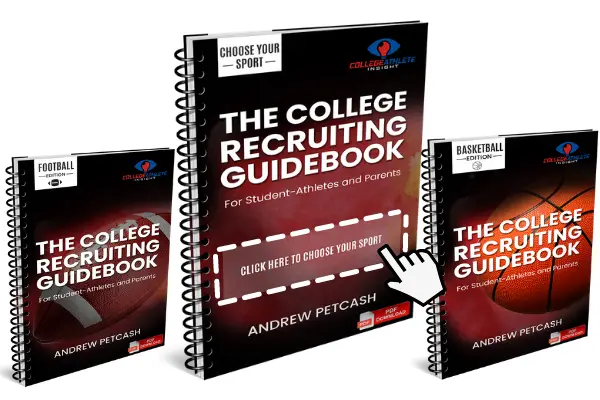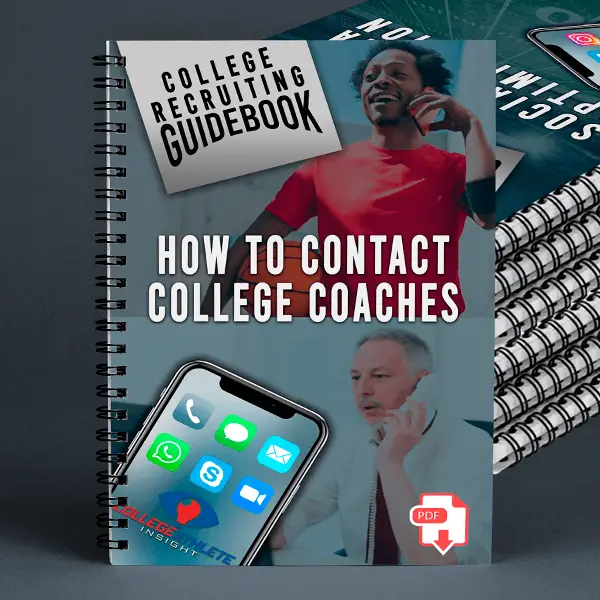Understand the differences of high school vs college sports is a commonly asked question.
Student-athletes/parents want to know how to be prepared, what to expect, and what they have to do in order to succeed.
People in general don’t like change; we like being comfortable and knowing what is going to happen next. Going to college throws that comfort factor out the window.
In order to grow athletically and as a human, change is inevitable and necessary. Learning how to be comfortable with being uncomfortable is a valuable asset that not many people possess.
College sports will push you to your limits in many facets of life. It is that intensity that will help you accomplish things you didn’t even know were possible.
The main differences between high school vs college sports
The difference between high school and college sports is drastic in some areas. However, in certain ways it is just more of the same with heightened expectations.
Your freshman year in college will feel the longest and be the most hectic. By junior year you won’t even remember what high school life was like.
Those who to college with an idea of what it is like are more likely to succeed early on than those who just jump right in.
Once your recruiting process wraps up it is important to start training for college. Many athletes make the mistake of relaxing or still preparing like they are in high school.
Your journey might feel like it has come to an end, but it has really just begun.
Schedule For High School
Probably the biggest difference between high school and college sports is the schedule and what an average day looks like. In high school, you are waking up at the same time and going to the classes for 8 hours every day.
For most high school students that means going to school from basically 8:00 am to 3:00 pm. You will then proceed to practice/lifting/film which usually is from around 3:30-6:30 depending on what sport you play and where you are in the season.
After that you are going back home to eat dinner, finish up homework, and spend the rest of your free time with family before going to bed. This process continually repeats itself with game days being the only exception.
Traveling to away games will almost always being under an hour long and you’ll take a generic school bus.
Schedule For College
In college, your schedule is going to look a whole lot different than it did in high school.
There are many variables that will factor in to what your schedule ends up looking like. This includes the sport you play, what semester your season takes place in, men’s or women’s, and what level of college sports you compete at.
For the typical athlete your day will involve waking up early for lifting, a few classes, practice and film, and study hall/tutoring with limited free time later at night.
Each day is going to be slightly different as some days you will have more classes than others, lifting and practice times might change, and you will be going back to your dorm or apartment rather than your home.
And you won’t be enjoying home cooked meals, but rather dining hall food which will become the regular option.
Traveling: High School vs College Sports
Traveling is going to be a huge adjustment from high school to college. It will vary by level, but regardless if it’s a two hour drive or five hour flight it will still cause disruptions in your schedule.
At the Division 1 level you are going to be traveling quite frequently and covering lots of miles across North America.
This throws a wrench in your schedule and makes school work particularly tough as you will often feel behind or that you are always playing catch up. Depending on your professor and University turning in assignments and making up tests while traveling is going to be unique.
At the Division 2 level some teams will travel like D1 programs, but most are going to be traveling by bus. Division 3 teams will travel less and the travel times will also be much shorter. It will look pretty similar to what traveling for high school sports was like.
NAIA and JUCO travel really depends on the conference and the level of the program. Some teams will travel like D1’s while others more like D3’s.
Traveling is going to be a major adjustment for most student-athletes in college. It will be done more frequently and you will be missing more stuff academically. Learning how to manage this is key!
If not done correctly you could fall behind on academics and have a low GPA or even worst become academically ineligible.
Most colleges will have tutors and study hall to help athletes stay on top of their school work.
The College Recruiting Guidebook
The college recruiting guidebook is the ultimate manual to earning an athletic scholarship for student-athletes and parents.
How would a $50,000/year athletic scholarship change your families life?
Inside the guidebook you’ll have access to:
- step-by-step instructions freshman through senior year
- every single college coaches email in the country (broken up by division and school)
- sample email/dm/text templates you can use
- a manual for parents on how to negotiate scholarships/financial aid with college coaches
- access to an array of bonuses you won’t find anywhere else
Parents will pay $20 just for admission in to their kids game. You can get this guidebook for the same price.
The college recruiting guidebook could literally change your families future!
Academics
Your classes in college are going to challenge you more than any class in high school ever did. You will grow accustomed to the changes over time, but your first semester is not going to be a cake walk.
To keep a high GPA you will have to utilize tutors, academic advisors, teacher assistants, and the professor’s office hours. These will be new concepts for most in bound student-athletes.
Keep in mind that some Universities will be much harder academically than others. Ivy League and most D3 schools will certainly be more rigorous in the classroom compared to other colleges.
When going through the recruiting process it’s important to create pros and cons list with academics being emphasized heavily. If you struggle managing schoolwork in high school then you should factor that in to your college decision.
When talking to college coaches don’t be afraid to ask how hard the academics are and what they do to support their student-athletes. If you’re on a visit talk with the academic advisors to get a better feel as well.
Making your college decision as a student-athlete is no easy task. Make sure to do your research so you will feel confident in your decision.
Competition
Most athletes transitioning from high school to college will want to have a better grasp on what to expect in terms of how much better players will be at the collegiate level.
A very small percentage of high school athletes will go on to play a sport in college. No matter what level of college sports you will be playing at it’s still a very prestigious group to be apart of.
The higher the division of play the more elite the competition. College athletes, as you would expect, are going to be much better players overall than what you are use to at the high school level.
For the average public school player you are going to be playing against teams with maybe 2-3 college athletes on them. In college, you are going to be practicing against competition equal to your talents or better every single day.
A senior in college going up against a freshman is going to have three-four more years of experience against that type of competition. That is a huge advantage and one of the main reasons why it is hard to play as a first-year player in college.
Your senior year highlight tape will look a lot better than your freshman year of college highlight tape.
Physicality
College athletes are going to much stronger, bigger, and faster than the average high school athlete.
Their bodies are going to be more developed and the athleticism they have is going to be apparent very quick. You probably observe this on social media everyday
This is mostly in part to the strength and conditioning opportunities presented. Some of the bigger universities spend millions of dollars each year on having state of the art lifting facilities with top of the line trainers.
Before heading to college you should make sure you are lifting 3-4 times a week with a trainer or on your own following a distinct plan based on the sport you play.
A football player needs to be lifting different from a basketball player and so on. That is why in our recruiting packages we offer unique forms of nutrition, weightlifting, and training plans based specifically on your needs.
Before heading to college you need to be training like you’re already playing at that level. You do not want to be training like you’re still high school.
Mentality
You are going to have a much different mental state in college compared to high school. College athletics improves mental strength because it pushes you to new limits that you were never exposed to before.
Getting up early to lift is much harder than getting up early to sit in class.
Being able to stay up to date in classes/assignments/tests when traveling while still performing your best is no easy task.
Having very few breaks or days off exposes your body to pains you didn’t know existed.
Having a coach cuss you out like never before decreases your confidence for a short period of time…you need to be able to recover from that.
Being tired is a mental barrier you need to push through and not let affect your performance in any way.
There are many other things that you never experienced before in high school that will test you mentally in college.
Be prepared and remember at the end of the day it the sport you love that has gotten you to where you are today. Tomorrow has even better things in store for you.
Think about how many people would love to be in your shoes as well. Mental toughness is key if you want to have success in college.
Your experiences from college sports will also prepare you for the real world and how to achieve success after hanging up the jersey.
Conclusion: High School vs College Sports
College sports is going to be a much different experience than high school.
The training, intensity of practice, traveling, living situation, nutrition, academics, competition, etc. are all going to be turned up a notch.
Depending on the person; adjustment to this can be super quick or even take up to a whole year.
College sports will push you to another level, but it will not only make you a better athlete but provide life-long relationships with teammates, financial aid depending on your division, stories you will never forget, employability for jobs, and many other wonderful things.




help in writing thesis thesis topics in education
write my paper apa style online paper writer
help in writing thesis help me write a thesis
coursework papers coursework science
academic essay writing service english essay writing help
proquest dissertations search proquest dissertation database